In the Dorset History Centre Frampton of Moreton collection there is an 1854 letter from Henry Frampton seeking advice on how to deal with a local farm labourer, John House, who had been charged with vagrancy.
To understand the context of the letter we need first to back-track to find out who John House was. Born in Poole in 1811, his parents had later moved to Hazelbury Bryan, where John met and married Bethia Crocker on 28 March 1832. John and Bethia quickly moved to Snelling (near Moreton) in the parish of Turners Puddle. Their first son was baptised twice: first in Moreton in September 1832, and then again in Hazelbury Bryan (abode given as Turners Puddle) in January 1833 – at a more respectable time after their marriage!
The Houses had three more children in Turners Puddle, and were living at Clouds Hill (later Lawrence of Arabia’s home) for the 1841 census. They then moved to Pallington, a hamlet of about a dozen cottages and a farm within Affpuddle, for thirteen years or so, with five more children baptised there between 1842 and 1854. These various baptisms, and the 1841 and 1851 censuses, all record John as a Labourer, and there is no other information on his life to draw upon – until we get to the narrative provided by Henry Frampton’s 1854 letter.
Life was clearly proving to be challenging for the House family. John was dismissed from his job, and thereby lost the entitlement to the cottage in which they were living. Bethia and children went to the Wareham Union Workhouse, but John refused to join them. Instead he found casual work in Wool. John was arrested for vagrancy twice, and sent to Dorchester Prison, first for one night…
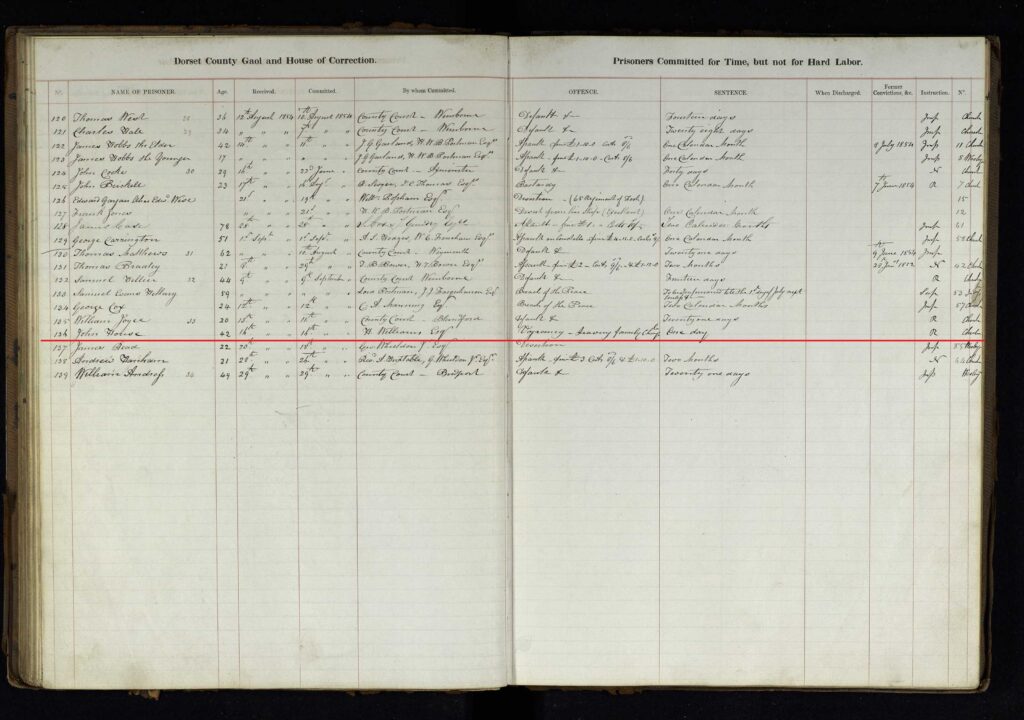
Dorset County Gaol and House of Correction –
Prisoners Committed for Time, but not for Hard Labour
John House, age 42, admitted 16 September 1854,
Vagrancy – Leaving family chargeable, One day.
…and then for two weeks:
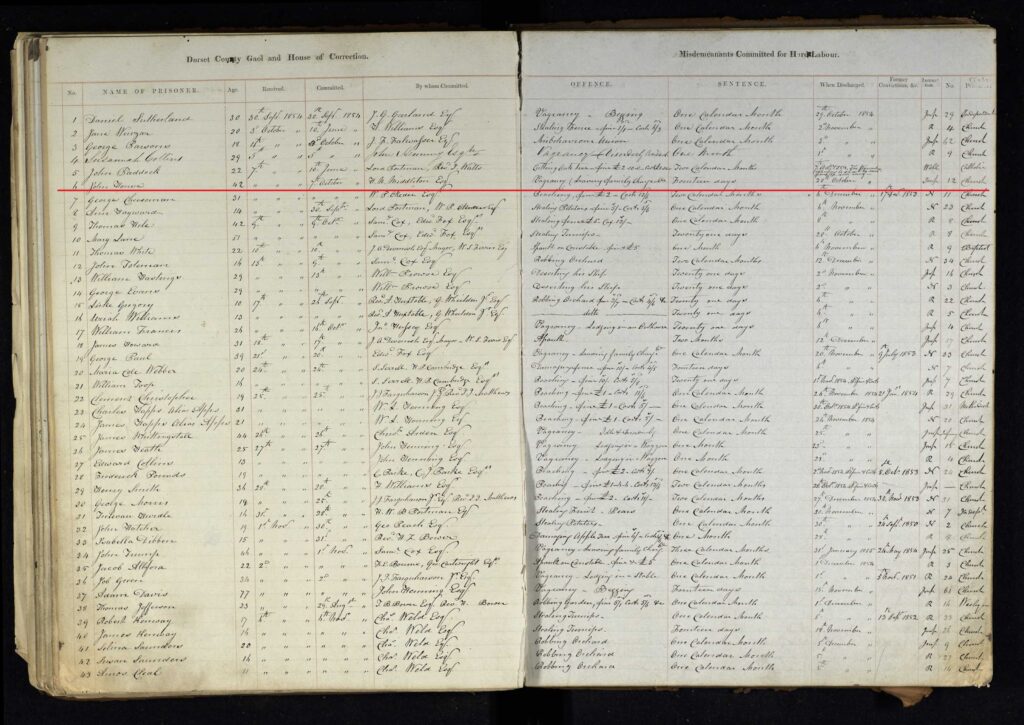
Dorset County Gaol and House of Correction –
Misdemeanants Committed for Hard Labour
John House, age 42, admitted 7 October 1854,
Vagrancy (Leaving family chargeable), Fourteen days.
Discharged 20 October 1854.
Wareham Union was a grouping of parishes, including Affpuddle, jointly providing a workhouse, and they were entitled to recover their costs for supporting the family to John’s parish – assumed to be Affpuddle – hence the phrase ‘leaving family chargeable’. But had John changed his parish by residing and working in Wool and, in any case, had Affpuddle really been his ‘chargeable parish’? With the head of the Frampton family being Lord of the Manor that included Affpuddle (but not Wool!), Henry Frampton was keen to get advice – he would soon become the Lord of the Manor himself with the death of his father James in early 1855.
In fact, the question was more significant than might at first appear. If John House was not ‘chargeable’ on any parish within the Wareham Union, then the workhouse was entitled to eject the family and ‘remove’ them to wherever their official parish of residence (‘settlement’) might be.
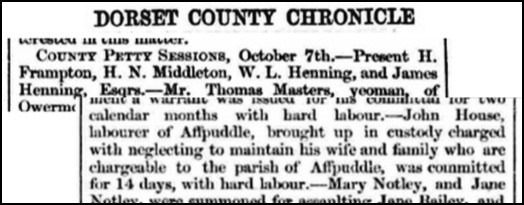
The concept of ‘irremovability’ was complex, and caused some confusion after it was introduced in 1846 as an amendment to the New Poor Law, so it is not surprising that Henry Frampton sought advice.
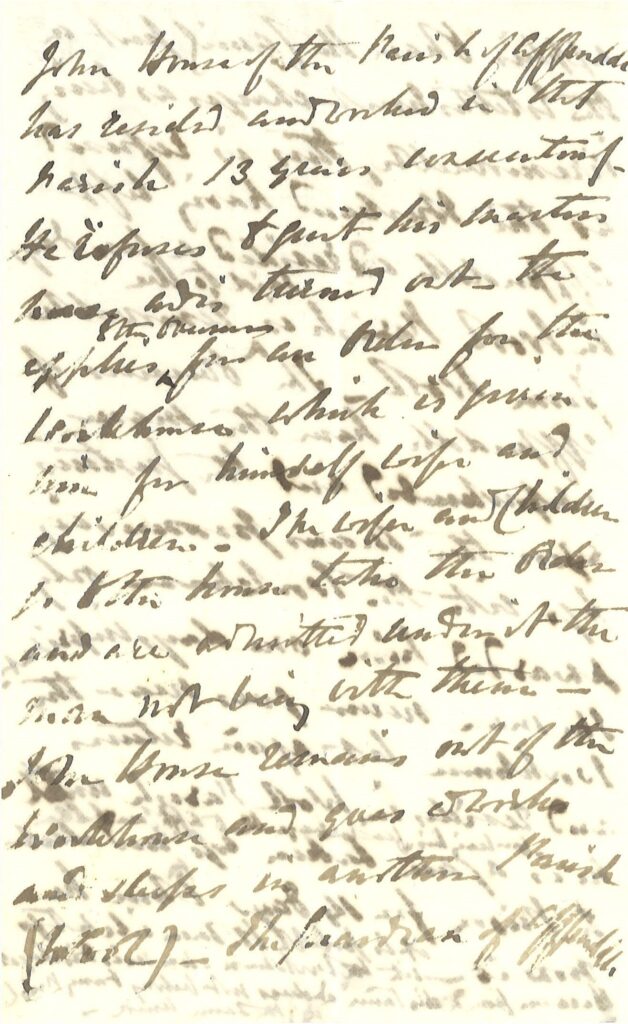
In October 1854 Henry wrote the letter we started this tale with, to a contact in Whitehall, London, and related the events so far:
John House of the Parish of Affpuddle has resided and worked in that Parish 13 years consecutively. He refused to quit his house when he was discharged by his Master and Landlord and was turned out of his house. He applied to the Overseer for an Order to go into the Workhouse for himself, wife and children which was given him. The wife and children were admitted into the house under the Order tho’ the man was not with them.
John House remains out of the Workhouse and works and sleeps for several days in another Parish (Wool). The Guardian of Affpuddle applies to have the family placed on the charge of the Establishment as being irremovable, this is refused as the man having left Affpuddle and resided in another Parish is said to permit again the removal from that Parish. The Overseer of Affpuddle had the man apprehended, and as the man promised the Justices before whom he was brought that he would go into the Workhouse they awarded him one days imprisonment.
The man does not go into the Workhouse but returns to the Parish of Wool where he works and resides until he is again brought up for leaving his wife and family chargeable to Affpuddle and is sent to Prison for 14 days where he now is – and it is probable the man will not go into the Workhouse upon his discharge from Prison. The man came to reside in Affpuddle from a distance and does not belong to any Parish in the same Union.
The ‘13 years’ fits with the five Affpuddle baptisms from 1842 to 1854. The ‘came to reside from a distance’ is because John was born in Poole and his wife in Hazelbury Bryan.
The answer from Whitehall was that it depended where the prison was: in the parish, or somewhere else. Dorchester Prison is, of course, not within Affpuddle, but Henry Frampton had not mentioned Dorchester in his letter. If the prison was within the parish, then the Union could not eject the family from the Wareham Workhouse, but if the prison was elsewhere then they could!
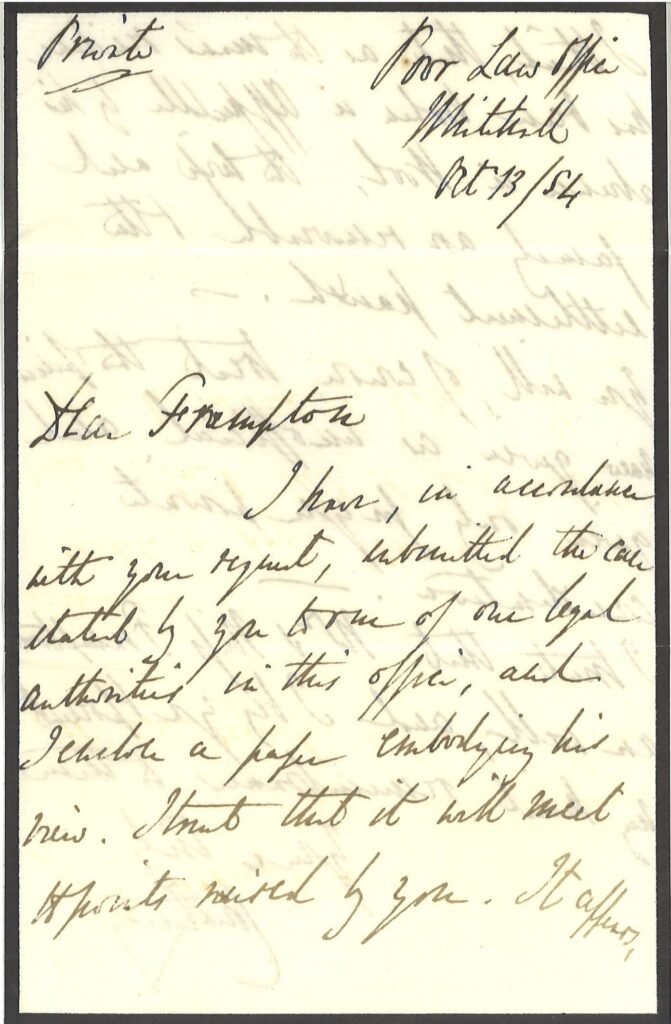
Settlement and Removal
A person born in Parish A was said to be ‘settled’ there, and if they became unable to support themselves (through illness, old age or being out of work) they could seek relief from Parish A’s workhouse. If they moved to Parish B and then needed support, Parish B could refuse and send them back to Parish A (‘remove’ them).
The 1846 Act said that after living for five years in Parish B then B’s workhouse could not turn them away – they had become ‘irremovable’. They would, however, still be ‘chargeable’ to A, and Parish B could send the bill for the support provided to Parish A. If after five years in B the person moved to Parish C, then Parish B immediately shed all responsibility, and the five-year clock was restarted for Parish C’s consideration.
So, in this case, the House family having resided in Affpuddle for ‘13 years consecutively’, were entitled to relief from the Wareham Union. The Overseer for Affpuddle then wanted to ensure the charges fell to the parents’ settlement parish (presumably Poole, being the husband’s), so he wrote to Wareham Union and asked for the family to be declared ‘irremovable’. The Union would then be responsible for recovering costs from Poole (or wherever).
But the Union’s reply was that because John House had moved to Wool, he had lost his right to irremovability from Affpuddle, and the family could be removed to somewhere else (that is to say, Parish A was Poole, Parish B was Affpuddle, and Parish C was Wool). Hence the response quoted in the letter that ‘this is refused…’, and, until the question was resolved, Affpuddle remained responsible for the charges.
The advice from Whitehall was basically the same, except that they were considering John House’s ‘residence’ in Dorchester Prison, rather than in Wool. If the prison was local (in Parish B) then they were still irremovable, but if it was elsewhere (Parish C), then they were removable.
There is no further correspondence to clarify the outcome and, as there are no surviving admission or discharge registers for Wareham Union Workhouse, it is not known when Bethia and the children managed to leave (there are Minute Books of the weekly meetings of the Board of Guardians which occasionally refer to individual inmates, but the 1853-55 book has no mention of the House family). However, John and Bethia’s next child was baptised in Wool in June 1857, with residence given as Bovington.
A happy outcome as far as the House family were concerned, but their case gives us a window onto the complexity of the workings of the Poor Law, by unpicking the details of a single letter in the Dorset History Centre archives!
—
A guest blog written for Dorset History Centre by Martin Gething, a volunteer with the National Trust who has been researching the families who lived at Clouds Hill.
Should you or your organisation wish to contribute a guest blog, please get in touch with us to discuss your idea.


John House is one of my Direct Relatives, being my Gt Gt Grandfather and father to my Grandfather William J R House, who was a skilled Wagon Maker at his Workshop in Melcombe Bingham/ Ansty.
According to my Family-history Research, he was living in the Tincleton area and was on Puddletown Heath, where he was found dead by his sister-in-law on the 18 January 1878. Her mark ‘X’ was placed on the Death Certificate.
The family certainly moved around regularly. I found them in Bovington (1857 baptism of Ellen), then West Burton, Winfrith Newburgh (1861 census), and Adminston Cottages, Athelhampton (1871 census), and then John died Puddletown Heath 1878.
In the censuses, the combination of birthplaces of Hamworthy (John), Hazelbury Bryan (Bethia) and Pallington (various children) confirm it is the same family being traced.
Had you realised your relatives were living at Clouds Hill in 1841 (and possibly for a few years before)?